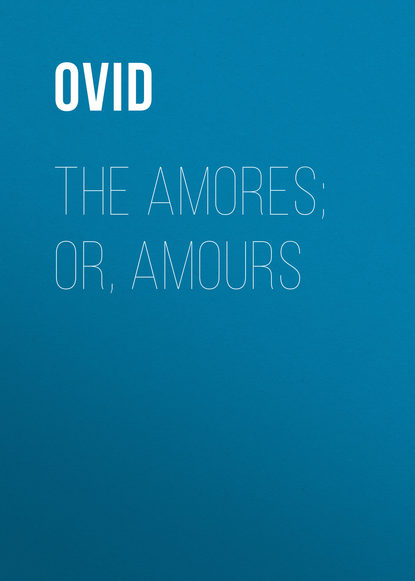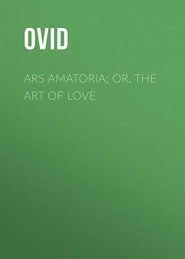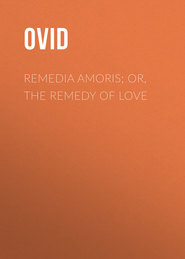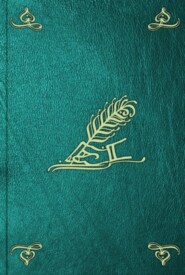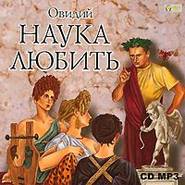По всем вопросам обращайтесь на: info@litportal.ru
(©) 2003-2024.
✖
The Amores; or, Amours
Настройки чтения
Размер шрифта
Высота строк
Поля
671 (return (#x6_x_6_i27))
[ Hold religious silence.—Ver. 29. 'Favere linguis' seems here to mean, 'to keep religious silence as to the general meaning of the term, see the Fasti, Book i. 1. 71.]
672 (return (#x6_x_6_i28))
[ Halesus.—Ver. 33. Halesus is said to have been the son of Agamemnon, by a concubine. Alarmed at the tragic death of his father, and of the murderers, Ægisthus and Clytemnestra, he fled to Italy, where he founded the city of Phalesus, which title, with the addition of one letter, was given to it after his name. Phalesus afterwards became corrupted, to 'Faliscus,' or 'Falisci.']
673 (return (#x6_x_6_i40))
[ One side and the other.—Ver. 32. For the 'torus exterior' and 'interior,' and the construction of the beds of the ancients, see the Note to the Eighth Book of the Metamorphoses, 1. 659. * Forced to love.—Ver. 39. This passage seems to be hopelessly corrupt.]
674 (return (#x6_x_6_i45))
[ Turning-place is grazed.—Ver. 2. On rounding the 'meta' in the chariot race, from which the present figure is derived, see the Note to the 69th line of the Second Elegy of this Book.]
675 (return (#x6_x_6_i45))
[ Heir to my rank.—Ver. 5. See the Tristia, Book ii. 1. 112, where he enlarges upon the rank and circumstances of his family.]
676 (return (#x6_x_6_i45))
[ To glorious arms.—Ver. 9. He alludes to the Social war which was commenced in the year of the City 659, by the Marsi, the Peligni, and the Picentes, for the purpose of obtaining equal rights and privileges with the Roman citizens. He calls them 'arma honesta,' because wielded in defence of their liberties.]
677 (return (#x6_x_6_i45))
[ Rome dreaded.—Ver. 10. The Romans were so alarmed, that they vowed to celebrate games in honour of Jupiter, if their arms should prove successful.]
678 (return (#x6_x_6_i45))
[ Amathusian parent.—Ver. 15. Venus was worshipped especially at Amathus, a city of Cyprus; it is mentioned by Ovid as abounding in metals. See the Metamorphoses, Book x. 1. 220 and 531, B. III.]
679 (return (#x6_x_6_i45))
[ The homed.—Ver. 17. In addition to the reasons already mentioned for Bacchus being represented as horned, it is said, by some, that it arose from the fact, of wine being drunk from horns in the early ages. It has been suggested, that it had a figurative meaning, and implied the violence of those who are overtaken with wine.]
680 (return (#x6_x_6_i45))
[ Lyæus.—Ver. 17. For the meaning of the word Lyæus, see the Metamorphoses, Book iv. 1. 11, and the Note to the passage.]
681 (return (#x6_x_6_i45))
[ My sportive.—Ver. 19. Genialis; the Genii were the Deities of pure, unadorned nature. See the Fasti, Book iii. 1. 58, and the Note to the passage. 'Genialis,' consequently, 'voluptuous,' or 'pleasing to the impulses of nature.']
[ Hold religious silence.—Ver. 29. 'Favere linguis' seems here to mean, 'to keep religious silence as to the general meaning of the term, see the Fasti, Book i. 1. 71.]
672 (return (#x6_x_6_i28))
[ Halesus.—Ver. 33. Halesus is said to have been the son of Agamemnon, by a concubine. Alarmed at the tragic death of his father, and of the murderers, Ægisthus and Clytemnestra, he fled to Italy, where he founded the city of Phalesus, which title, with the addition of one letter, was given to it after his name. Phalesus afterwards became corrupted, to 'Faliscus,' or 'Falisci.']
673 (return (#x6_x_6_i40))
[ One side and the other.—Ver. 32. For the 'torus exterior' and 'interior,' and the construction of the beds of the ancients, see the Note to the Eighth Book of the Metamorphoses, 1. 659. * Forced to love.—Ver. 39. This passage seems to be hopelessly corrupt.]
674 (return (#x6_x_6_i45))
[ Turning-place is grazed.—Ver. 2. On rounding the 'meta' in the chariot race, from which the present figure is derived, see the Note to the 69th line of the Second Elegy of this Book.]
675 (return (#x6_x_6_i45))
[ Heir to my rank.—Ver. 5. See the Tristia, Book ii. 1. 112, where he enlarges upon the rank and circumstances of his family.]
676 (return (#x6_x_6_i45))
[ To glorious arms.—Ver. 9. He alludes to the Social war which was commenced in the year of the City 659, by the Marsi, the Peligni, and the Picentes, for the purpose of obtaining equal rights and privileges with the Roman citizens. He calls them 'arma honesta,' because wielded in defence of their liberties.]
677 (return (#x6_x_6_i45))
[ Rome dreaded.—Ver. 10. The Romans were so alarmed, that they vowed to celebrate games in honour of Jupiter, if their arms should prove successful.]
678 (return (#x6_x_6_i45))
[ Amathusian parent.—Ver. 15. Venus was worshipped especially at Amathus, a city of Cyprus; it is mentioned by Ovid as abounding in metals. See the Metamorphoses, Book x. 1. 220 and 531, B. III.]
679 (return (#x6_x_6_i45))
[ The homed.—Ver. 17. In addition to the reasons already mentioned for Bacchus being represented as horned, it is said, by some, that it arose from the fact, of wine being drunk from horns in the early ages. It has been suggested, that it had a figurative meaning, and implied the violence of those who are overtaken with wine.]
680 (return (#x6_x_6_i45))
[ Lyæus.—Ver. 17. For the meaning of the word Lyæus, see the Metamorphoses, Book iv. 1. 11, and the Note to the passage.]
681 (return (#x6_x_6_i45))
[ My sportive.—Ver. 19. Genialis; the Genii were the Deities of pure, unadorned nature. See the Fasti, Book iii. 1. 58, and the Note to the passage. 'Genialis,' consequently, 'voluptuous,' or 'pleasing to the impulses of nature.']





